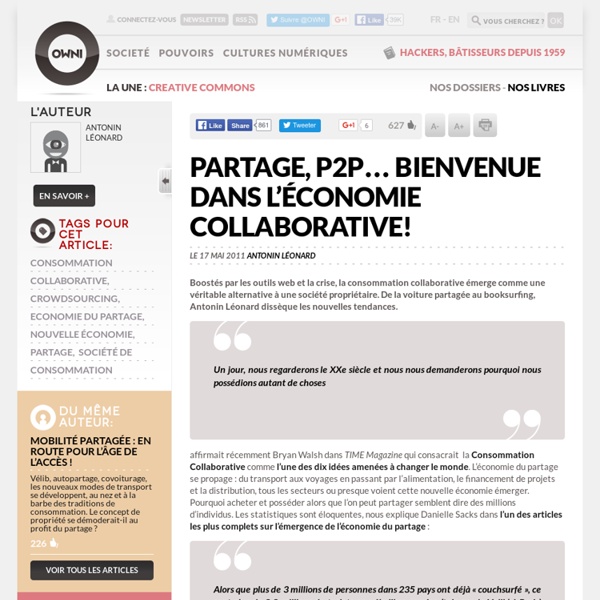



http://owni.fr/2011/05/17/nouvelle-economie-partage-consommation-collaborative-p2p/
DriveNow: BMW / Sixt Joint Venture - car sharing The BMW Group and Sixt AG are planning a unique and innovative car sharing venture. With effect from April 2011 onwards – initially in Munich and later in Berlin – the two companies intend to join forces in offering a modern mobility concept under the brand-name DriveNow; this new product will combine vehicles and service of the highest quality with simple, flexible usage. DriveNow is the first car sharing concept to place an emphasis on efficient premium vehicles and comprehensive service.
Raising procurement’s self-esteem First impressions Procurement professionals are indoctrinated into the profession with messages such as “you have to take the internal customer along with you”, “you have to persuade them” and “you have to get their buy-in first”. But what if internal customers are wrong? Support mentality Procurement frequently defines itself as a “support function” whose status is derived by the amount of money it spends and the amount it saves. One reason for this is that procurement’s role is frequently not directly tied to key business goals. Meta-currency - Rheonomy - Eric Harris-Braun In her beautifully insightful book, The Nature of Economies, Jane Jacobs suggests that we must broaden our understanding of economics in the context of the flow processes of the natural world. Near the end of the book one of her characters asks the question, “What are economies for?” One of the other characters answers: “… To enable us to partake, in our own fashion, in a great universal flow” Another character answers with “Economies have a lot in common with language… like language, economic life permits us to develop cultures and multitudes of purposes… that’s its function which is most meaningful for us.”
Is the Facebook generation the key to procurement’s future? As the owner of a website, blog, LinkedIn group and a novice Twitter user, I am no stranger to social media, but certainly no expert. It is clear through listening across the blogosphere, however, that social media is coming to procurement – ready or not. As the profession’s old hands increasingly recruit from the “Facebook generation”, these bright young technology-minded individuals are going to have growing influence on the future of our profession and I believe smart organisations will start planning for the upside and downside of this transition of power. As social media begins to integrate into corporate life, procurement can play a key role observing and analysing all sides of the business. It is perfectly positioned between the customer side, internal stakeholders and the supply side to become a centre for spend intelligence.
The connected company Many thanks to Thomas Vander Wal for the many conversations that inspired this post. The average life expectancy of a human being in the 21st century is about 67 years. Do you know what the average life expectancy for a company is? Surprisingly short, it turns out. In a recent talk, John Hagel pointed out that the average life expectancy of a company in the S&P 500 has dropped precipitously, from 75 years (in 1937) to 15 years in a more recent study. Why is the life expectancy of a company so low? A waste of collaborative buying expertise Why, when government is touting centralisation as the answer to all its spending ills, is it disbanding collaborative buying groups? Firebuy has gone. The UK’s nine Regional Improvement and Efficiency Partnerships (RIEPs) are on the way out. At least one NHS joint buying hub has already been given the chop. And other such bodies, such as the National Policing Improvement Agency (NPIA), are under review. Things are always being changed in the public sector – that’s a given.
Thinking outside the inbox According to French IT firm Atos Origin, the tired old email is on its way out of business and set to be replaced by a younger, funkier way of communicating. Aka: social media. Speaking at an innovation conference yesterday, Atos Origin CEO Thierry Breton announced that it aims to become a zero e-mail company within three years. The rationale for the move is that email takes up too much time and effort in the workplace, whereas social media doesn’t. Now, okay, Atos Origin is an IT company, and as such it may well be planning on releasing a social media-based alternative to email. And in the meantime it’s already working on an alternative to emails sent internally between colleagues.